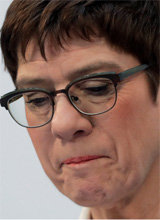Merkel’s preferred successor says she won’t run for chancellor
Merkel’s preferred successor says she won’t run for chancellor
Posted February. 12, 2020 08:12,
Updated February. 12, 2020 08:12

Annegret Kramp-Karrenbauer, German Chancellor Angela Merkel’s preferred successor, has announced that she will stand down as the leader of the Christian Democratic Union (CDU) and will not be running for the German chancellorship at the next election. Her decision is to take responsibility for her party’s collaboration with the far-right Alternative for Germany (AfD), which is considered a taboo in Germany. The AfD members helped a CDU candidate win the election for governor in Thuringia.
Kramp-Karrenbauer said on Tuesday local time at the party’s headquarters in Berlin that she will quit her role as the party leader after organizing a leadership contest in summer, according to The Associated Press.
Kramp-Karrenbauer, dubbed “mini-Merkel,” was appointed by Merkel as the secretary general of the CDU in 2018 while serving as the premier of Saarland. After becoming the party leader in December 2018, she has been expected to replace Merkel who will step down next year. Although Kramp-Karrenbauer lost ground in the party that lost votes at last year’s European Parliamentary Election and local elections, she has been considered the favorite to replace Merkel.
The election result for the German state of Thuringia was the reason behind her sudden announcement. During the election campaign, the CDU backed Thomas Kemmerich, business-friendly Free Democratic Party (FDP) candidate, as new Thuringia prime minister. It had been widely expected that leftwing leader Bodo Ramelow would be re-elected as Thuringia prime minister since the CDU is only the third party in Thuringia.
The problem was the AfD strategically backed the FDP candidate instead of its own and Kemmerich actually won the election as a result. As a result, the FDP candidate won the election due to the collaboration between the ruling CDU and the far-right extremist AfD. The collaboration with the “neo-Nazi” shocked the country and Kramp-Karrenbauer quit her role, taking the responsibility for the fiasco.
Against this backdrop, the German politics is likely to undergo a major transformation after the mini-Merkel steps down. Former CDU Chairman Friedrich Merz, who used to be Merkel’s political rival, is emerging as the new favorite to replace Merkel. Merz, strongly supported by conservative members within the party, was voted as the most favored candidate to replace Merkel in a survey conducted in December 2019. Other key candidates include Health Minister Jens Spahn, CDU Deputy Chairman and North Rhine-Westphalia Prime Minister Armin Laschet, and Christian Social Union leader Markus Söder.
Youn-Jong Kim zozo@donga.com







